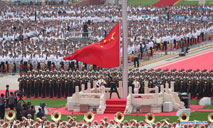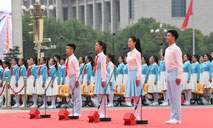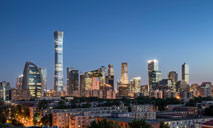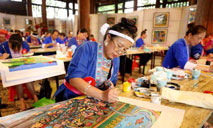Honeybee tourism sweetens NW China town
YINCHUAN, July 5 (Xinhua) -- On a breezy night, 69-year-old Xia Ningcheng was playing saxophone for his friends, while they were barbecuing cheerfully near a hillside apiary in the Liupan Mountain, northwest China's Ningxia Hui Autonomous Region.
"I had never been to a bee-themed 'agritainment' before. I'm told that the honey produced here is quite special. I'd like to buy some for my family," said Xia, as he stopped playing for a sip of honey tea.
The enchanting aura already prompted Xia to plan his next trip with his family. "The city is ubiquitous with the honking of horns, so the chirping birds here made me relax. I think my family would love to visit this place."
Wang Dingxiang, 47, owner of the agritainment and also a beekeeper himself, lives in Dongshanpo Village of Jingyuan County in Ningxia's Guyuan City -- located in the interiors of the Liupan Mountain.
The place is home to more than 530 Chinese medicinal herbs, and it boasts many high-quality natural bee yards. Locally produced honey has always been popular.
Wang used to help his grandfather extract honey and clean up honeycombs when he was a child. He later went to the city to explore entrepreneurial prospects but returned to his hometown in 2016 to become a beekeeper after his failed attempt at entrepreneurship.
"The local honey is made from various kinds of wildflowers and medicinal herbs, therefore it is nutritious, rich in flavor and popular among consumers," said Yan Xueqin, director of the Chinese Bee Industry Development Service Center in Jingyuan.
The Liupan Mountain is deemed a summer resort due to its pleasant climate and landscape, with the scenic beauty attracting more and more tourists every year. Wang saw an opportunity and wanted to take an advantage of the booming tourism.
"Tourists usually buy some honey when they leave. More tourists mean more sales," said Wang. He admitted that the burgeoning tourism was one of the main reasons for him to come back.
Wang restored the old houses, redesigned his big yard and planted peonies -- shaping it into a recreational place. He also forged 360 honeycombs and raised more than 300 chickens. His guests can barbecue, drink honey tea and sing on karaoke.
Wang has also been livestreaming since last April, which has so far attracted more than 5,400 regular viewers from across China. During the livestreaming sessions, he demonstrates how to raise bees and make honey and shows glimpses of the unique local landscapes in different seasons.
"I livestream all year round. It is important to build connections with viewers. Orders generate from the trust," said Wang.
He received approximately 400 guests last year, most of whom were regular visitors. His bee yard yields 2,000 kg of honey every year. Last year, his gross income reached 300,000 yuan (about 46,350 U.S. dollars).
"Tourists feel fresh and sometimes stay for days. They take photos, sing on karaoke and savor special farm-based delicacies," Wang said.
The booming apiculture and tourism are inducing more sweetness for local residents. Official data showed that there are over 35,000 honeycombs of bees in Jingyuan, with an annual yield of 300,000 kg of honey and a revenue of more than 50 million yuan.
According to Wang Xin, deputy director of the local tourism department, the county witnessed over 1 million tourists last year, generating a total revenue of 790 million yuan.
Li Yong, head of a bee-related experimental station in the city of Guyuan in Ningxia, said bees can also help restore vegetation through pollination, so as to facilitate the development of industries like eco-agriculture and tourism.
Photos
Related Stories
- China's post-gaokao economy boosts tourism, electronics, beauty sector
- China's red tourism booms in H1: report
- China to see boom in tourism market as summer vacation draws near
- Dragon Boat Festival holiday expected to generate 100 mln trips in China
- Inner Mongolia holds various activities to promote tourism
Copyright © 2021 People's Daily Online. All Rights Reserved.










